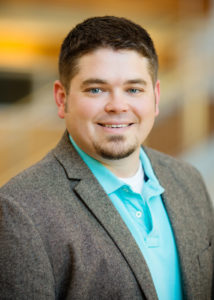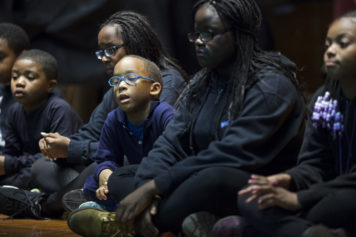T. Jameson Brewer, a doctoral candidate at the University of Illinois Urbana-Champaign, along with alum Sarah Matsui, recently ruffled feathers when they stated that Teach for America, an organization that sends recent college graduates into troubled school districts, didn’t do enough to prepare corps members.
In an article in Jacobin, that was later picked up by NPR, Brewer and Matsui also accused TFA of encouraging corps members to buy into the “hero teacher” narrative, the idea that all minority children in underperforming schools need is a good teacher and hard work to turn their lives around. He also said many TFA corps members developed negative attitudes towards their students and were overwhelmingly white college grads working in predominately minority communities. After the article, was published TFA reached out to The Atlanta Blackstar in a long mail denouncing Brewer and Matsui’s allegations.
Brewer said this was not surprising since TFA is fiercely protective of its image.
“TFA relies on the image of its brand,” Brewer said. “TFA prides itself on inflating applications through a massive recruiting budget, all the while systematically keeping acceptance rates extremely low. This results in a façade of prestige and, in turn, reinforces the circumstances that drive applications higher.”
Brewer said TFA also believes in turning education over to the private sector and the use of standardized tests. President Barack Obama recently came out against the overuse of tests to evaluate students.
“TFA fully believes that its role in privatizing teacher education and pushing test scores as the singular focus of educators is benefiting students,” Brewer said.
TFA also disputed Brewer’s use of the “hero teacher” narrative. However, Brewer said that he witnessed this during his two years with the Atlanta-Metro corps.
“I was immediately struck that TFA’s pedagogical and theoretical framework insisted that teachers bear the sole responsibility for student outcomes (good or bad),” Brewer said. “TFA discourse and materials explicitly state that dedicated teachers are the best solution for overcoming poverty.”
He said TFA ignores the realities of generational poverty. Students from poor backgrounds often need more than a hard-working teacher to lift them up.
However, there were other ways of reinforcing the “hero teacher” narrative. Brewer talks about this in his recent book (co-edited with Kathleen deMarrais), Teach for America Counter-Narratives: Alumni Speak Up and Out. The book contains narratives written by 19 former corps members, a former staff member and education scholar Barbara Torre Veltri, a professor at Northern Arizona State University, who has researched TFA’s recruitment methods and corporate culture.
In the book, alumni Summer Pennell wrote about her experiences. Pennell said, “The savior mentality was fed by Friday pep rallies where we were told we were the chosen ones, that students in our regions needed us, and that we could deliver them to salvation through our teaching. Some corps members thrived under this praise.”
TFA also challenged Brewer’s assertion they send mainly white college grads into schools with minimal training. But Brewer stands by this.
“While TFA has shifted some of its recruiting to include people of color, TFA’s model is to bring high-achieving college graduates – historically from Ivy League and otherwise prestigious schools – to teach in the inner city,” he said. “And while some (few) of these corps members share the background of students in troubled neighborhoods, the suggestion that 18 hours of student teaching in an unrealistic setting could prepare someone for any classroom is offensive.”
He said historically underserved schools need well-trained and experienced teachers, not recent college grads who get cumulatively two and half days of student teaching.
TFA also said they had made steps to improve diversity. They said about 50 percent of this year’s corps members are people of color. Brewer replied it was laudable that TFA has tried to diversify its corps members, but there is still a problem with their messaging which tends to support “white cultural assumptions about what it means to be successful.”
“So, while TFA has made itself less white on the surface, corps members still employ a discourse of meritocracy, a narrative of ‘hard work’ overcomes poverty (thereby suggesting that student’s parents who are poor aren’t ‘hard workers’ – a deficit ideology towards Black and brown communities), and continues the savior narrative,” Brewer said.
Deputy spokesperson Sharise Darby said TFA had evolved over the years and made great strides to improve diversity. The organization’s CEO, Elisa Villanueva Beard, is a Latina.
“Over the years we have worked to increase the number of teachers of color,” she said.
According to Darby, 49 percent of the 2015 corps members are people of color, with 20 percent of them being Black. She also pointed out that the teaching profession in general needs to do a better job of diversifying its ranks. Only 20 percent of teachers nationwide are people of color.
Darby added that even if TFA corps members are not people of color, they still identify with some of the struggles students from minority communities face. For example, those who were from low-income background or identify as LGBTQ can still identify with socio-economic problems and diversity issues students face and serve as role models.
She said the idea TFA sends under-trained white college graduates into minority neighborhoods is an outdated stereotype. A third of corps members are career changers, professionals or graduate students who decided to quit their previous professions and take up teaching.
Darby said she was also confident that TFA provides corps members with adequate training to go into the classroom. All corps members across the country receive on average six to eight weeks of pre-service training, coupled with professional development and training they receive from TFA in the first two years in the classroom.
“We feel confident corps members are set up for success,” Darby said. “We want [corps members] to be humble, respectful and make sure they are having a positive impact on their students.”
Darby also said TFA is continuing to push for diversity among teachers and has partnered with the Alpha Phi Alpha fraternity to recruit more Black men to be teachers. Currently only 2 percent of teachers nationwide are Black men.



